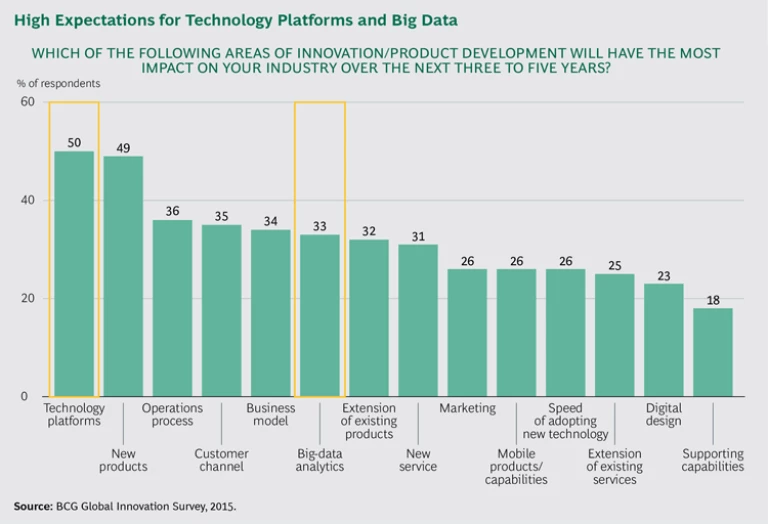This article is an excerpt from The Most Innovative Companies 2015: Four Factors that Differentiate Leaders (BCG report, December 2015).
New tools can make a big difference, and across all industries, new technologies, especially digital and data-based technologies, are powerful tools. At leading companies, technology is evolving from a functional silo to a foundation for breakthrough innovation in products, services, and business models.
In this year’s survey of the state of innovation at companies worldwide, advances in technology platforms ranked as the most important factor driving innovation, and big-data analytics was not far behind. (See the exhibit.) This isn’t just lip service: more than half of those who see tech platforms and big data as having a big impact are actively pursuing them as avenues of innovation.
Multipurpose Platforms
Technology-enabled innovation comes in many flavors. It can mean using advanced analytics to improve decision-making, employing digital technologies to retool manufacturing, and harnessing mobile capabilities to improve marketing, to name just a few. The crux in all cases is the creation of a platform that can be leveraged repeatedly to deliver impact. In our experience, technology platforms can bring benefits in at least four areas: cost and timeline reduction, often though automation; business transformation; the enhancement of process; and, most significant, business model innovation through the creation of new types of products and services.
Take the example of General Electric, which used the new technology of additive manufacturing (also known as 3-D printing) to reduce the cost of manufacturing transducer probes, the most expensive component in ultrasound equipment. This innovation resulted in both significant efficiencies and more flexible production lines, driving down costs, which, in turn, led to uses of the technology where price had previously been prohibitive, such as in inspection equipment for industrial processes. GE is now exploring how 3-D printing can be used in additional businesses, including jet engine manufacturing.
All kinds of companies, in industries from the most basic to the most advanced, are applying technology-enabled innovations with substantial effect. For example, IBM has created a $7 billion business through its Smarter Planet initiative, which puts technology advances to work in everything from installing smart grids for water conservation to using big-data analytics to improve urban services. A major cement maker used a combination of digital, mobile, and geolocation technologies to develop a delivery model that reduced its fleet size by 35%; it also enabled a step change in customer service by narrowing delivery windows by 90% and reducing missed deliveries by 97%. Google and Facebook are experimenting with drones and balloons to bring mobile Internet access to rural and hard-to-reach areas in developing countries.
How to Get There
Companies that develop and innovate using technology platforms put several practices in place. They regard functions such as IT and analytics as centers of value rather than of service or cost. They tend to centralize innovation (44% of both strong and disruptive innovators use a centralized innovation model), and they make sure to have staff 100% dedicated to innovation. They follow a structured approach rooted in a clear strategic vision; their organizations enable innovation; and they are supported by specialist expertise. Their approach features tight alignment between the business functions and IT, sound system architecture, a partnership attitude (both internally and with external resources), and, more and more frequently, an agile style of innovation development.
Adopting these practices is far from easy—companies encounter a host of organizational and cultural hurdles—and it typically involves a journey that is measured in years. The challenges can be daunting: breaking down organizational silos, shifting to an agile process, moving from a heavy IT architecture to modular systems, and overcoming internal resistance.
One of the most difficult—and important—organizational and cultural shifts is moving from a traditional “waterfall” approach to idea development, in which stopping a project is seen as tantamount to failure, to an agile approach that sets as many ideas racing as possible and quickly and happily kills off the ones that fail to show potential. Companies that make this change also become good at taking in ideas from all kinds of sources, including internal idea labs, external scouting, thought leader monitoring, vendor relationships, crowd sourcing, and academic partnerships.
Companies that want to pursue more technology-enabled innovation can start by taking the following steps, distilled from the best practices of global leaders:
- Deliberately allocate budget and resources to technology innovation. Approaching the challenge as an extra or add-on responsibility will not work. Establishing a cross-functional, dedicated R&D lab is often a good way to start.
- Put in place appropriate incentives for individuals to pursue innovation. Organize innovation contests, provide rewards and recognition, and (where appropriate) include innovation in job objectives.
- Foster a test and learn, fail fast and fail cheap mentality. Encourage risk taking by actively reporting on both successes and failures. Communicate explicit approval of management’s willingness to try and fail.
- Encourage a collaborative approach between IT and business units. At companies that are strong innovators, IT is no longer in its own silo. Instead, technical talent is integrated into business units and innovation teams.
Technology-driven innovation is hard. But the payoff is big—often extending well beyond a single new product to a platform or capability that can enable other innovations for years to come.






